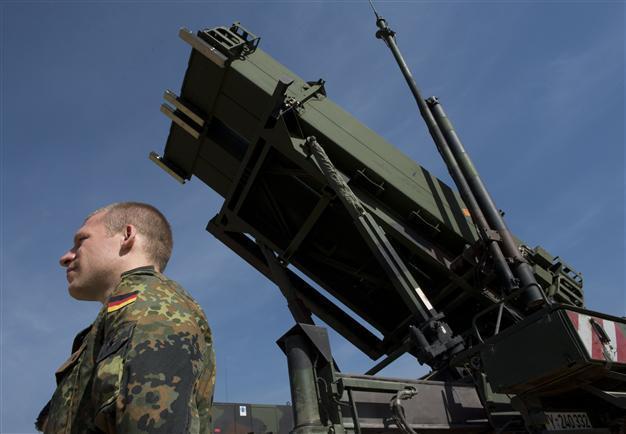Germany to end Turkey Patriot missile deployment
BERLIN – Anadolu Agency

Picturen taken on March 25, 2014, shows a German soldier standing to attention in front of a German Patriot missile launcher at the Gazi barracks in Kahramanmaraş, southern Turkey. AFP photo
Germany will end its contribution to NATO's Patriot anti-missile systems in southern Turkey by the beginning of 2016, the Federal Ministry of Defense said on Aug. 15."The decision was taken after the present assessments made by the NATO in June 2015, which concluded that the threat against Turkish territories by Syrian ballistic missiles is very low," the ministry said in a statement.
NATO Patriot batteries have been stationed about 100 kilometers north of the Syrian border since January 2013. Germany provides two of the five NATO batteries and around 250 personnel to the mission, which is mandated to the end of January.
The deployment was made at Turkey's request following the shooting down of a Turkish jet by Syrian forces in June 2012 and the killing of Turkish civilians by Syrian shellfire four months later.
"Together with our NATO partners we have defended the Turkish people against possible missile attacks from Syria," Defense Minister Ursula von der Leyen said in the statement. "Our Patriot missiles have successfully carried out their mission."
She added that the threat in the region now came from ISIL.
"Therefore, we will continue our engagement for the stability of the region," she said. "Not only by training and supporting the Kurdish and Iraqi security forces in Arbil but also with our naval force… in the eastern Mediterranean."
The deployment was criticized by opposition parties in recent months for being costly and ineffective and media reports claimed the mission was using too many of the German army's missile specialists.
German media reports said the timing of the decision indicated it was not a reaction to Turkey's renewed offensive against the outlawed Kurdistan Workers’ Party (PKK). Last month, von der Leyen voiced concerns about Turkish airstrikes on the PKK bases in northern Iraq.
















